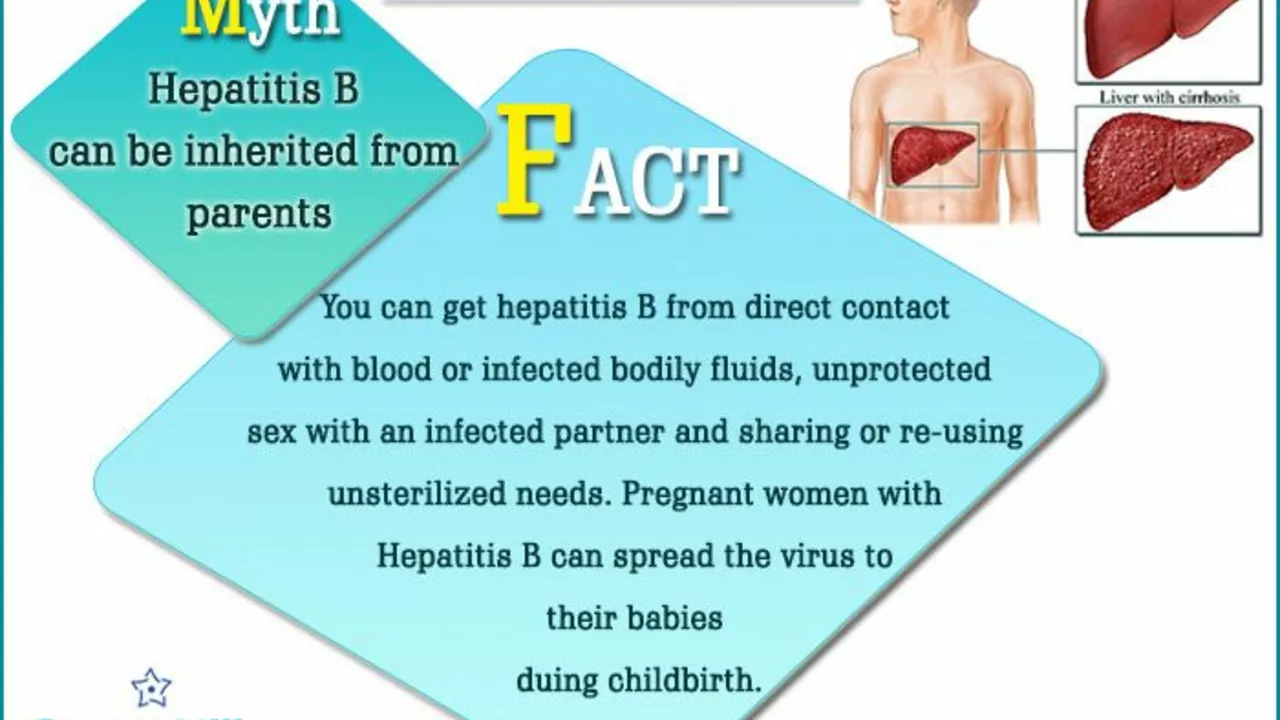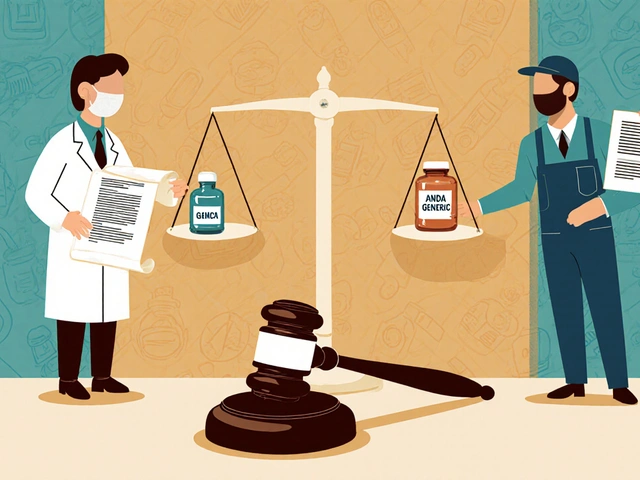Introduction to Hepatitis C and Its Management
As someone who has been studying nutrition for many years, I have come across many different health conditions that are influenced by diet. One such condition is Hepatitis C. It's a viral infection that causes liver inflammation, potentially leading to serious liver damage. The Hepatitis C virus (HCV) spreads through contaminated blood. While many individuals with Hepatitis C experience no symptoms, long-term infection can lead to chronic liver disease. This is why managing Hepatitis C is crucial, and nutrition plays a vital role in this management.
The Importance of Balanced Nutrition
When you are dealing with Hepatitis C, maintaining a balanced diet is essential. A nutritious diet can help to strengthen your immune system and support your liver health. Malnutrition is common in people with Hepatitis C, and it can worsen the course of the disease. On the other hand, a well-balanced diet can help to improve liver function and manage symptoms of the disease. It's not just about eating the right foods, but also about maintaining a healthy weight and avoiding certain harmful substances.
Beneficial Foods for Hepatitis C
There are several foods that are particularly beneficial for people with Hepatitis C. These include fruits and vegetables, lean proteins, whole grains, and healthy fats. Fruits and vegetables are packed with vitamins, minerals, and antioxidants that can help to support your immune system and liver health. Lean proteins, like chicken, fish, and tofu, can help to repair liver damage caused by Hepatitis C. Whole grains provide necessary energy and fiber, while healthy fats, like those found in olive oil and avocados, support overall health.
Foods to Avoid When You Have Hepatitis C
Just as some foods can benefit those with Hepatitis C, others can potentially harm. For instance, alcohol is especially harmful to the liver and can exacerbate Hepatitis C complications. Similarly, foods high in saturated and trans fats can contribute to liver damage. Processed foods often contain these harmful fats, along with high amounts of sugar and sodium. It's also recommended to limit your consumption of red meat and dairy products, as they can increase inflammation in the body.
The Role of Hydration
Hydration is an often-overlooked aspect of nutrition, but it's particularly important for those with Hepatitis C. Staying hydrated helps to maintain the health of your liver and aids in the process of detoxification. It's recommended to drink at least 8 cups of water per day, but this amount can vary based on individual needs. It's also wise to limit your intake of caffeinated beverages, as they can lead to dehydration.
Supplements and Hepatitis C
While getting your nutrients from whole foods is always the best option, sometimes supplements can help to fill in the gaps. However, it's important to talk to your doctor before starting any new supplement regimen, as some can potentially interfere with Hepatitis C medications or cause further liver damage. Some potentially beneficial supplements for those with Hepatitis C include B vitamins, vitamin D, and probiotics, but again, it's crucial to seek professional advice before starting these.
Seeking Professional Advice
While this guide provides a general overview of the role of nutrition in managing Hepatitis C, everyone's situation is unique. Therefore, it's essential to seek professional advice. A registered dietitian or a healthcare provider can provide personalized nutrition advice based on your specific needs and conditions. Together, you can create a diet plan that not only helps manage your Hepatitis C but also supports your overall health and well-being.







Harrison Dearing
23 July 2023 - 03:16 AM
I've seen too many people think eating kale will cure their liver. Nah. HCV ain't a salad. You need meds, not smoothies. 🤦♂️
Justice Ward
24 July 2023 - 00:25 AM
This is actually one of the most thoughtful breakdowns I've seen on this topic. The way you tie antioxidants to liver repair? Chef's kiss. I've seen folks lose weight and feel stronger just by swapping out processed junk for real food. It’s not magic-it’s biology.
bhuvanesh kankani
25 July 2023 - 17:45 PM
In India, we have a tradition of turmeric in warm milk for liver health. While science may not fully validate it yet, many elders swear by it. I believe in combining ancient wisdom with modern medicine-not replacing one with the other.
maria norman
26 July 2023 - 16:12 PM
Oh wow. Another article telling us to eat more veggies. Groundbreaking. I'm sure the pharmaceutical industry is just weeping into their patent filings right now. 😏
Iris Schaper
27 July 2023 - 02:14 AM
i read this and thought… wait, so we’re back to ‘drink water’ as a medical recommendation? like… yeah. but also? maybe stop drinking 6 beers a night? just a thought.
katerine rose
28 July 2023 - 14:41 PM
Stop with the food stuff. Just take the pills. I had a cousin who ate quinoa and kale and still ended up on the transplant list. Nutrition is a distraction.
Selma Cey
30 July 2023 - 11:20 AM
If nutrition mattered, why do people with perfect diets still get liver failure? Coincidence? Or is Big Pharma hiding the truth? 🤔
Francis Pascoe
31 July 2023 - 16:21 PM
You think this is helpful? I’ve been on DAAs for 3 years. My liver’s clean. I still eat pizza and soda. Your ‘nutrition advice’ is just fear-mongering dressed up as wellness. Stop pretending you’re a doctor.
Richa Shukla
2 August 2023 - 08:45 AM
u kno wat they dont tell u? the gov is pumpin toxins in the water so ppl need more 'nutrition'... its all a scam. i saw it on a video. u eat fruit? u r gettin sprayed by chemtrails. 🌎💧
Chris Rowe
2 August 2023 - 13:56 PM
why do all usa articles sound like they written by a wellness influencer? drink water. eat greens. lol. we got real problems here.
Sushmita S
4 August 2023 - 06:08 AM
i tried eating more veggies but my liver still hurt 😔
AnneMarie Carroll
4 August 2023 - 17:45 PM
You're being dangerously naive. Nutrition doesn't cure HCV. Only antivirals do. And if you're telling people to skip meds for 'whole grains', you're not helping-you're endangering lives.
John K
6 August 2023 - 03:31 AM
America got the best meds in the world. Why are we listening to some diet blogger? Eat beef, drink water, take your pills. That’s it. 🇺🇸💪
Laura Anderson
8 August 2023 - 01:13 AM
The epistemological framework of nutritional intervention in chronic viral hepatitis is inherently reductionist. The liver's metabolic plasticity cannot be adequately modeled through macronutrient ratios alone. One must consider the interplay of gut microbiota, epigenetic modulation, and systemic inflammation-a complexity that your article glosses over with the ease of a TED Talk.
Avis Gilmer-McAlexander
8 August 2023 - 11:13 AM
I appreciate the balance here. I had HCV and did the treatment, but I also changed how I ate-and I swear, my energy came back in ways I didn’t expect. Not because kale healed me, but because I stopped treating my body like a garbage disposal.
Jerry Erot
9 August 2023 - 00:28 AM
Actually, I reviewed the meta-analysis from the Journal of Hepatology last week. The correlation between dietary fiber and reduced fibrosis progression was statistically significant at p<0.03. You might want to cite that.
Fay naf
9 August 2023 - 10:49 AM
The entire premise is a neoliberal distraction. Capitalism commodifies wellness to extract profit while the medical-industrial complex profits from lifelong surveillance. Your 'balanced diet' is just a placebo for the middle class who can afford organic kale. Meanwhile, the working poor are left with subsidized sugar and liver failure.
ANTHONY SANCHEZ RAMOS
10 August 2023 - 06:57 AM
yo i just finished treatment and this made me cry 😭 i used to eat nothing but fried chicken and soda but now i cook chicken breast with broccoli and drink water like a grown up 🙌 thanks for the nudge! im feelin so much better!
Matt Czyzewski
11 August 2023 - 08:06 AM
There is a profound irony in our modern obsession with dietary optimization as a proxy for health agency. We have outsourced our bodily sovereignty to algorithms, influencers, and macro-counters-while the true healing power of rest, community, and psychological safety remains unaddressed. Nutrition is a tool, not a savior.